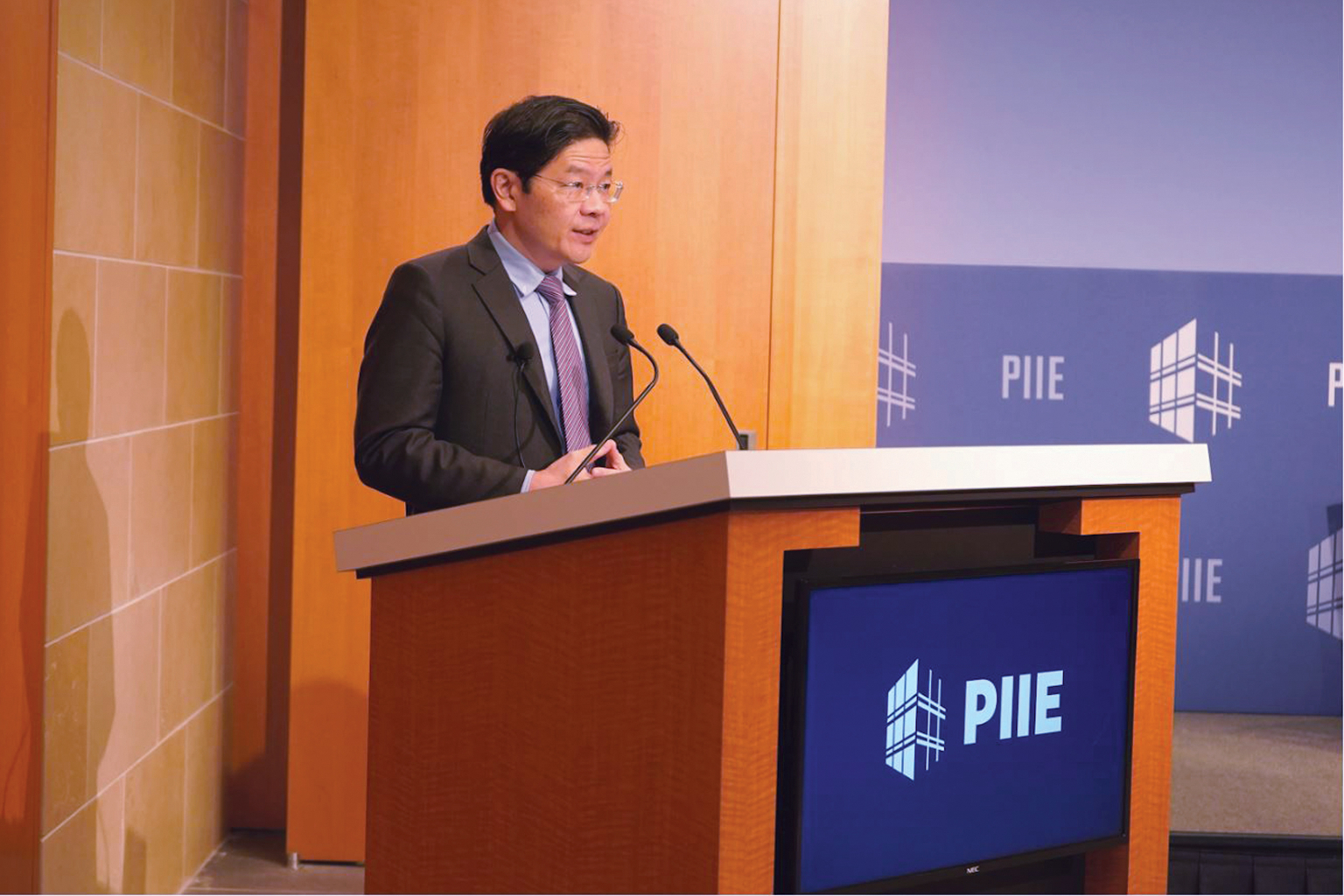Govts must drive inclusive, sustainable growth in face of global uncertainties: Lawrence Wong
Sign up now: Get ST's newsletters delivered to your inbox

Finance Minister Lawrence Wong pointed out that growth has been less inclusive.
PHOTO: MINISTRY OF FINANCE
Follow topic:
SINGAPORE - Governments must drive inclusive and sustainable growth in response to the uncertainty and deep structural challenges that are faced today, said Finance Minister Lawrence Wong on Monday (April 18).
This means repurposing fiscal policy and the role of the state towards building longer-term capacity and public goods, which can include infrastructure such as healthcare and education.
It also requires fostering a refreshed common agenda between the public and private sectors beyond specific projects, in areas such as research and development (R&D) and lifelong learning, he added.
Externally, it also calls for a reinvigorating of the international order such that it is open and based on rules, with a stronger commitment to multilateral solutions.
Mr Wong was speaking at the Peterson Institute for International Economics, an independent research organisation, as part of a trip to Washington DC and New York City to meet members of the United States administration and attend the World Bank-IMF Spring Meetings, among other engagements.
It is Mr Wong's first public speech since he was announced as the leader of the ruling PAP's fourth-generation (4G) team last week, a move that paves the way for him to be Singapore's next prime minister.
In a keynote address, he touched on the difficulties faced by economies and the possible response to them.
"Economies everywhere have still not fully recovered from the lingering effects of Covid-19, especially in restoring supply chains," he said.
"We now face another major challenge, precipitated by the war in Ukraine. We are not out of the frying pan, but already into another fire."
These issues add to the structural challenges of growth, inclusion and sustainability, he added.
Globalisation is heading into a new era of decoupling, with the possibility of a more divided world economically that mirrors a more divided world politically, he added.
Growth has also been less inclusive, Mr Wong pointed out, as technology has contributed to the shrinking of middle-class jobs in some industries and Covid-19 also hit unskilled workers disproportionately.
He added: "The consequence of these factors - weak and uneven income growth, high inequality, and weak social mobility - pose significant risks for us all. When people feel that the odds are stacked against them - when they cannot reach the top no matter how hard they try; when their children will never do better than them - social stability is affected, and things start to fall apart."
Meanwhile, the need for meaningful action on climate change grows greater, especially as reliance on fossil fuels is expected to increase in the short term with the Ukraine conflict.
"This may be necessary to cope with the short-term energy shortages, and to keep the lights on. But it also means that we must redouble our efforts in the medium and longer term, to set the right price for carbon, regulate emissions and invest in cleaner, low-carbon technologies," he said.
To respond to these challenges, Mr Wong noted that it "is not just about the amount of spending, but how and what we spend on".
He added: "It's about the state playing a more active and purposeful role to achieve important longer-term goals - to raise productivity, to tackle inequality and rekindle social mobility, and to catalyse the green economy."
Public spending can work better for the common good, through spending on rejuvenating and expanding critical infrastructure, investing in early child development and renewing areas that experienced economic decline, he suggested.
Tackling these issues would also require wider and deeper collaborations between the public and private sectors. In R&D, for instance, both parties could work together to drive technological breakthroughs in areas of pressing need, such as green solutions to tackle climate change, even when the technologies are not yet bankable or investable.
Globally, Mr Wong also suggested strengthening multilateral cooperation on global public goods, which includes supporting countries in building up their national healthcare capacities to tackle new health threats.
International cooperation can also help tackle climate change, he said, which involves creating global standards for disclosures and reporting.
Ultimately, the international system has to be kept open and inclusive, with multilateralism fortified, Mr Wong said.
"Today, the world seems more divided than ever before. The future has never seemed more uncertain. But amidst our differences, we must find enough common ground with each other to solve our collective problems."
He warned: "Failure to cooperate internationally, preserve stability and invest in the global commons will have disastrous longer-term consequences for the world."
During his trip, Mr Wong will also attend the World Bank-IMF Spring Meetings and Second Finance Ministers and Central Bank Governors Meeting under the 2022 Group of 20 Indonesian presidency.
He will also attend the Financial Action Task Force Ministers Meeting and meet with business leaders.

